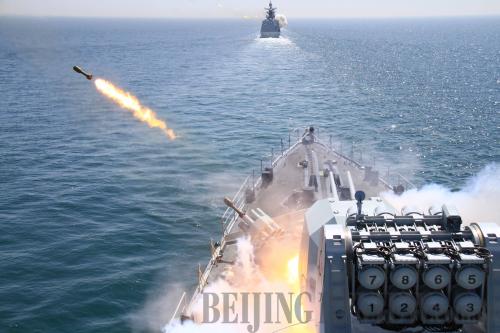|
 |
|
MILITARY EXERCISE: China and Russia conduct a joint military exercise in the Yellow Sea off Qingdao, east China's Shandong Province, on April 26, 2012 (WANG DONGMING) |
Everyone's dream is different. But most countries' are similar: to make themselves strong and prosperous. For two neighboring powers like China and Russia, promoting bilateral cooperation is helpful in turning such dreams into reality, due to a common interest in development and responsibility in maintaining peace and stability in the neighborhood, as well as the world.
China's newly elected President Xi Jinping conducted his first state visit to Russia from March 22-24 to further relations. This visit, which happened at a pivotal moment in bilateral ties, will definitely be of historical significance.
A profound visit
A newly elected state leader's first state visit is always eye-grabbing. Xi's first appearance as Chinese leader in Russia reflects the two countries' high-level relationship. Currently, both sides enjoy a solid, comprehensive, strategic and cooperative partnership, continually deepening practical cooperation based on mutual trust.
President Xi told Russian media in Beijing on March 19, "The fact that I will visit Russia, our friendly neighbor, shortly after assuming presidency is a testimony to the great importance China places on its relations with the country and to the high level and special nature of the comprehensive strategic partnership of coordination between both sides."
According to Chinese Assistant Foreign Minister Cheng Guoping, Xi's visit to Russia was aimed at sustaining the traditional relationship. Every newly elected state leader of each country routinely chooses the other as his first state visit destination. For example, Russian President Vladimir Putin also paid his first state visit to China last June after he was reelected.
During Xi's visit, he exchanged opinions with Russian leaders like President Putin and Prime Minister Dmitry Medvedev. The two countries jointly issued a statement and an action plan on implementing the Treaty of Good Neighborliness and Friendly Cooperation from 2013-16. The two sides also signed 20 cooperative documents concerning fields like trade, economy, energy, investment, local cooperation, cultural exchange and environmental protection.
"The China-Russia relationship now is at its highest level in history. The two sides believe there will be an even bigger breakthrough in future," said Cheng.
Both sides are very optimistic about their future relationship, and gave high credibility to Xi's state visit to Russia. "President Xi's visit served as a link between the past and the future," said Wang Lijiu, a researcher in Russian studies with the China Institutes of Contemporary International Relations (CICIR). He pointed out that during the past decades, the China-Russia friendship has been maintained at a high level. "Both sides show a strong and common willingness to further the current relationship. And they have the potential and ability to fulfill this," Wang stressed to Beijing Review.
The countries have similar ambitions for a prosperous future. "In spite of their respective indexes, China and Russia have similar schedules and goals," said Wang. China plans to fully establish a moderately prosperous society by 2020. By then, its GDP and per-capita income will double that of 2010. According to Russia's development strategy, it would like to squeeze into the list of the world's top five economies by 2020.
Sergey Luzyanin, Deputy Director of the Institute of Far Eastern Studies at the Russian Academy of Sciences, believed Xi's visit was an iconic event in the Sino-Russian relationship. The visit not only showed the extremely significant status of this relationship in China's foreign policy, but also mirrored its decision in sustaining its usual tradition of pushing forward the Sino-Russian comprehensive strategic cooperative partnership. He spotlighted the special importance of the visit in a complicated international situation. "The trip is going to promote the bilateral relationship to a new level," he said at a press conference on March 18.
| 